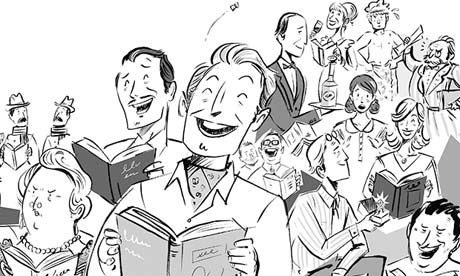
Illustration by Adam Gale for the Guardian
The scene: a radio station in Bremen, Germany. The year: 1998. I'm doing what authors are often doing when they aren't writing a book: plugging one that they've already written. This one is called The House of Sleep. On the whole it's a rather melancholy, not to say twisted love story but there are a couple of scenes in it of the sort that critics refer to as "comic set-pieces". In one of them, two people are talking at cross-purposes about the burial of a dead body: one of them thinks they're talking about a human corpse, the other about a cat's. In another, the omission of one misplaced footnote reduces a scholarly article to nonsense.
I know these scenes are comic because I've read them aloud to audiences, and the audiences have laughed. It's always nice, that – when something you've written connects strongly with people. But I'm not connecting well with this radio interviewer. It's all going very badly, full of hesitant silences and dead airtime. So I decide to start riffing about comedy. I did an MA dissertation on theories of comedy at university so I'm on solid ground here. A whistle-stop tour of 18th-century theories of laughter, followed by a bit of Bergson and a dollop of Freud. My interviewer, I can tell, is impressed. Impressed, but also a little confused. From the other side of the microphone, he flashes what we comical writers like to call a quizzical look. "This is all very interesting, Mr Coe," he says. "But one thing about what you have just said puzzles me." I lean forward, confident that I can field pretty much any question on this subject. "If you are so interested in what makes things funny …" (a finely judged, possibly lethal pause) "why don't you write funny books?"
To this day I still don't know whether he just wanted to humiliate me on air or whether he had genuinely read the whole of The House of Sleep without laughing once. (Quite possible, I'm sure.) But what I do remember, as my mouth flapped open and shut like a landlocked fish, was having a sort of out-of-body experience. I suddenly saw myself, as if from a detached, ironic height, as a fictional character: as a character, that is, in a comic novel. A naif at loose on the continent, straight from the pages of Malcolm Bradbury, as prey to the whims of a random, indifferent universe as a luckless Michael Frayn protagonist.
More
I know these scenes are comic because I've read them aloud to audiences, and the audiences have laughed. It's always nice, that – when something you've written connects strongly with people. But I'm not connecting well with this radio interviewer. It's all going very badly, full of hesitant silences and dead airtime. So I decide to start riffing about comedy. I did an MA dissertation on theories of comedy at university so I'm on solid ground here. A whistle-stop tour of 18th-century theories of laughter, followed by a bit of Bergson and a dollop of Freud. My interviewer, I can tell, is impressed. Impressed, but also a little confused. From the other side of the microphone, he flashes what we comical writers like to call a quizzical look. "This is all very interesting, Mr Coe," he says. "But one thing about what you have just said puzzles me." I lean forward, confident that I can field pretty much any question on this subject. "If you are so interested in what makes things funny …" (a finely judged, possibly lethal pause) "why don't you write funny books?"
To this day I still don't know whether he just wanted to humiliate me on air or whether he had genuinely read the whole of The House of Sleep without laughing once. (Quite possible, I'm sure.) But what I do remember, as my mouth flapped open and shut like a landlocked fish, was having a sort of out-of-body experience. I suddenly saw myself, as if from a detached, ironic height, as a fictional character: as a character, that is, in a comic novel. A naif at loose on the continent, straight from the pages of Malcolm Bradbury, as prey to the whims of a random, indifferent universe as a luckless Michael Frayn protagonist.
More
No comments:
Post a Comment